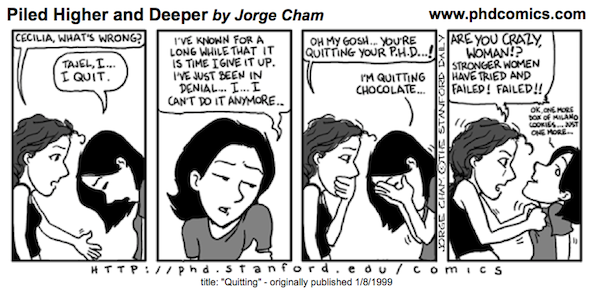This “Piled Higher and Deeper” comic strip by Jorge Cham seems apposite:

“Piled Higher and Deeper” by Jorge Cham: www.phdcomics.com
No-one wants to be seen as a quitter. And none of us want to advise a student, colleague or friend to quit doing something in which they have invested heavily. Or support them, if they decide to quit. However, the moment I put it like this, it is clear that quitting must the right thing for some people on some occasions, and at times should be carried out, advised or supported. You don’t have to be an economist, or know terms like sunk cost and opportunity cost, to see this. You don’t have to live your life according to platitudes, and never “throw good money after bad” to see it. The problem is that quitting has a very bad reputation. Who hasn’t heard of Lance Armstrong’s recent activities? Or his earlier saying: “Pain is temporary. Quitting lasts forever.” Who wants to be for quitting?
I’ve dealt with quitting from several perspectives over the years. Looking back, I am surprised at my inconsistency. I started my first year at university doing a combined science and medical degree. I wanted to fulfil a long-term ambition to become a doctor, and then go into medical research. By the end of my first term, I had dropped out of medicine, and switched to a math major. I started my postgraduate career working towards a PhD in statistics. By the end of my first term I had dropped out of that, and taken a teaching job in another university. Not long into that job, I encouraged a first-year student to drop out. I saw that his heart wasn’t in academic study, but elsewhere, and I said, “Follow your heart.” It looks as though I had unconsciously hit upon the business mantra, “Fail early, fail fast, fail often.”
In due course I got a math PhD and started advising graduate students. The one who would have been my second successful PhD student was doing well. He’d published a paper on his research in a top journal, given me a near final draft of his thesis for comment, and gone back to his hometown, for his funding had run out. I mailed my relatively minor comments to him, and waited for him to file his thesis. He never did. I wondered whether my comments were so harsh that I’d discouraged him (I didn’t think so), or whether I’d failed him in some other way. Much later I learned that he had had a long and successful career as a schoolmaster. Only now am I admitting the possibility that it wasn’t my fault, that perhaps he made a career choice, and consciously dropped out. I would never have supported a decision to quit so close to success.
Since that PhD student I have had four others drop out while under my supervision. One went back into industry, one ended up having a successful research career in the area of his never completed PhD thesis, one moved to a different PhD program, and I lost touch with the fourth. Each time I saw their leaving as a failing in me, feeling that I had let them down. Perhaps I did, but perhaps they simply made sensible career decisions.
I have had many conversations about quitting with students and colleagues over the years. The ones I’ve mentioned are the most personal. What have I learned from my experience and conversations? To state the obvious, I now believe that quitting can be wholly desirable. For many people, it’s the beginning of a new and successful phase in their life. Listen to the ‘Freakonomics’ guys on this. Teachers, mentors, thesis advisors: it’s not necessarily about you! It may be, but there are other good reasons for quitting.
Here’s what a wise PhD student friend of mine told me recently. “My friend wants to quit [for] a combination of two reasons. One: she doesn’t like what she does and wants to do something else with her life; two: her advisor doesn’t know what she (my friend) does… Reason one ≫ reason two. A PhD is often very difficult in that it rarely offers many fulfilling moments, even more so if one is not head over heels in love with what one does. The feeling of fulfillment is very important to human beings, I think. Feeling you are doing something really useful (instead of writing a paper that no one reads), getting spectacular results (which rarely happens), being able to support the people one loves financially, etc. So sometimes people will go off to get it from somewhere else. That’s how I see why people quit their PhDs”.
As with PhDs, so with later life. Do what you like doing, do something you do well, try to balance life and work, seek fulfillment.
A dilemma: to quit or not to quit?

Comments on “Terence’s Stuff: Quitting”